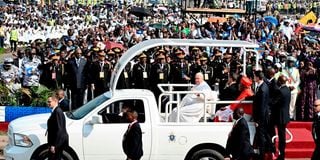Pope’s wheelchair politics to Africa

Pope Francis arrives by popemobile for the mass at the N'Dolo Airport in Kinshasa, Democratic Republic of Congo (DRC), on February 1, 2023.
The leader of the world’s 1.3 billion Catholics, Pope Francis, arrived in the Democratic Republic of Congo on Tuesday on a visit that will also take him to South Sudan.
He carries with him a message of peace to the long-suffering nations, which are wracked by war and its related barbarities.
Popes have been quite conservative—even reactionary—figures, clinging doggedly to the Catholic Church’s line against ordaining women as priests, opposing abortion (even birth control) and being blind to the sexual abuse of boys by its bishops and priests.
Not so Pope Francis; he has been outspoken on issues of climate justice; decried global inequality; made some liberal noises about homosexuality; and even signalled that he is open to women stepping up on the pulpit as priests.
On the last point, the church had better make haste. Not too long ago, while visiting a family in the US, we went for Easter Mass at a nearby Catholic church.
The church was, to my surprise, full. However, about 99.5 per cent of the worshippers were women. All the ushers were women. All the “altar boys” were little girls—except one boy.
All the people who took readings were women. All the people who passed the bag around collecting God’s money were women. The two lay Catholics assisting the priest were women.
All but two of the choir members were women. From the middle row, where we sat, the only men we could see in front were the priest and the little altar boy.
As good Kenyans would say, “the ka-thing is gone”. The women have taken over the mountain. The Catholic male establishment is only holding on to the peak. If they don’t kiss the Catholic women’s rings, they will freeze to death at the summit.
And that is why Pope Francis is not only a rebel but is also subversive. The manner of his entrance was, in many ways, a statement about power and fragility and signalling exit.
The pontiff got off his plane and then took to his wheelchair. African leaders fear the wheelchair because they consider it a great sign of weakness.
The case of former Algerian autocrat Abdelaziz Bouteflika would only have confirmed their worst fears. In power since 1999, reports of Bouteflika being seriously ill started to emerge in early 2015. He didn’t appear in public with a walking stick or in a wheelchair until 2016. Before long, he was toast and eventually forced to resign in 2019.
Spectacular falls
Zimbabwe’s iron-fisted Robert Mugabe was more manful. Refusing stick or wheelchair, he would wobble, shaking like a leaf in a storm, grabbing rails, clinging to walls and dragging himself to the pulpit, including at the UN General Assembly in New York and the Forum on China-Africa Cooperation (Focac) in Beijing. The result is that he had a couple of spectacular falls.
A wheelchair would have saved Mugabe all the indignities but it was the one thing he wouldn’t sit on in public. It didn’t help. It was obvious he was a shell of his old revolutionary self. In 2017, the ruling party and the army put him out of his misery and ended the national disgrace. It bundled him out of power.
An even more pitiful spectacle is on display in Cameroon. Paul Biya, 89—who lives mostly in Europe and lords it over his country in absentia—has been in power for 41 years. He is Africa’s second-longest-ruling president after Equatorial Guinea’s dictator Teodoro Obiang Nguema Mbasogo, in office for 43 years.
Age, the wear and tear of office, and keeping his hair pitch-black have taken their toll on Biya. At last December’s US-Africa Leaders Summit in Washington, DC, Biya embarrassed his country and Africa enough to last the continent at least five years.
Staggering on stage, he didn’t know where he was and who was in the room as panicked aides struggled to keep him in the present. The one thing that he did very successfully—and also the one thing he shouldn’t have done—pass the wind loudly on stage.
Pope Francis, 86, younger than Biya, has hinted at retiring soon. His retirement would have been problematic. It would have meant there being three popes alive—one serving and two retired. He ascended to the throne after Pope Benedict XVI resigned in February 2013 (the first in 600 years to step down rather than die in office) and continued to live in the Vatican.
According to people who understand Catholic politics, Benedict’s death at the end of last December has opened a path for Pope Francis to retire.
So, here he is, all but brandishing his wheelchair in the face of our ‘Presidents-for-life’, telling them to get off the macho thing, embrace their frailties that they hide from the public and defy by clinging on to power past their expiry date, and leave office even before, like in his case, they are scheduled to.
And he has said it all without saying it. How annoying, this pontiff!
Mr Onyango-Obbo is a journalist, writer and curator of the “Wall of Great Africans”. @cobbo3





